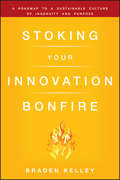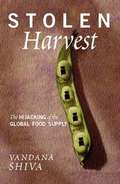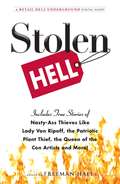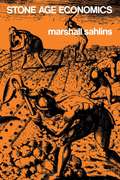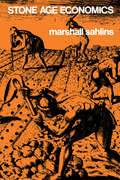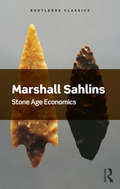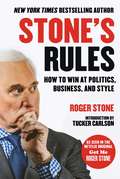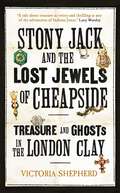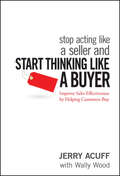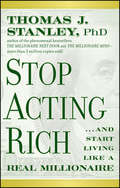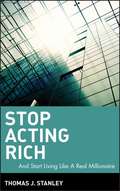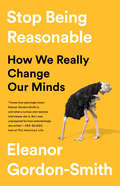- Table View
- List View
Stokers and Pokers: London & North Western Railway, Electronic Telegraph & Railway Clearing Hse.
by Francis B. HeadPublished in the year 1968, Stokers and Pokers is a valuable contribution to the field of Economics.
Stoking Your Innovation Bonfire
by Braden Kelley Rowan GibsonEssential strategies to transform your organization and boost your profits Want to recapture your organization's original innovative spirit? Stoking Your Innovation Bonfire helps you remove the obstacles that have crippled the innovation superpowers that made your organization successful in the first place. Helps you identify the blockages hindering innovation within your organization Reveals the fundamental changes that will help your business rebuild its hidden or lost innovation capabilities Explores leading innovation theories you can apply right away-without expensive consultants Get the strategies you need to remove innovation barriers, increase profits-and change the way you do business.
Stolen Harvest: The Hijacking Of The Global Food Supply
by Vandana ShivaA devastating expose of what the globalized agricultural industry is doing to our land and our food.
Stolen Hell
by Freeman HallGreedy Grabbers, Privileged Pinchers, Shady Scammers, and More!Whether they're swiping merchandise or conning cashiers, Nasty Ass Thieves (NATs) can be retail's worst nightmare.Do they honestly think they can return merchandise they didn't buy? Or muscle their way out of a private chat with Loss Prevention? Or short-change drawers every time they shop?Apparently they do - or there wouldn't be these 36 hilarious-and-true stories from RetailHellUnderground.com bloggers about NAT run-ins of every shape and size. From food scammers to hulking shoplifters to the unthinkable tale of "Paint and Poo," these stories will make you look - and laugh - a little harder at your fellow customer.
Stolen: How to Save the World from Financialisation
by Grace BlakeleyA must-read polemic about why the 'recovery' from the 2007-08 crash mostly benefited the 1%, and how democratic socialism can save us from a new crash and climate catastrophe.For decades, it has been easier to imagine the end of the world than the end of capitalism. In the decade leading up to the 2008 financial crisis, booming banks, rising house prices and cheap consumer goods propped up living standards in the rich world. Thirty years of rocketing debt and financial wizardry had masked the deep underlying fragility of finance-led growth, and in 2008 we were forced to pay up. The decade since has witnessed all kinds of morbid symptoms, as all around the rich world, wages and productivity are stagnant, inequality is rising, and ecological systems are collapsing.Stolen is a history of finance-led growth and a guide as to how we might escape it. We've sat back as financial capitalism has stolen our economies, our environment and even the future itself. Now, we have an opportunity to change course. What happens next is up to us.
Stolpersteine auf dem Weg zur Überwindung des Terrors
by Yair Sharan Elizabeth Florescu Ted J. Gordon, LLCIn diesem Buch werden die potenziellen Entwicklungen des Terrorismus und die Möglichkeiten diesen zu verhindern, bewertet. Das Buch thematisiert die wachsende Bedrohung durch die Verfügbarkeit neuer Technologien und wie diese dazu beitragen können, diejenigen mit potenziell böswillige Absichten aufzuhalten. Der Donnerhall des Terrors ertönt von überall her; wie können wir ihn aufhalten? Was sind die Stolpersteine auf dem Weg dorthin und wie können wir sie vermeiden? Immer mehr Menschen haben Zugang zu immer mehr Informationen und immer mehr zerstörerischen Technologien. Inzwischen helfen uns fortschrittliche Technologien, eine sicherere und harmonischere Welt zu schaffen. Vorteile und Nachteile verstärken sich gegenseitig. Während die hybriden Bedrohungen zunehmen, steigen auch die Möglichkeiten, ihnen zu begegnen. Doch was sind die Kompromisse und wie können wir sie abmildern? Dieses Buch befasst sich auch mit den unerwarteten und oft zufälligen Erfolgen und Misserfolgen von Maßnahmen zur Bekämpfung der sich entwickelnden Terrorgefahr. Die verschiedenen Aspekte des Terrorismusphänomens werden auf einzigartige Weise anhand von Szenarien dargestellt, die dem Leser ein realistisches Bild von der Bedrohung vermitteln. Die Kombination positiver und negativer Auswirkungen aufkommender Technologien beschreibt eine der vielleicht wichtigsten Dimensionen unserer gemeinsamen Zukunft.
Stone Age Economics
by Marshall SahlinsAmbitiously tackling the nature of economic life and how to study it comparatively, the book includes six studies which reflect the author's ideas on revising traditional views of the hunter-gatherer and so-called primitive societies, revealing them to be the original affluent society. The book examines notions of production, distribution and exchange in early communities and examines the link between economics and cultural and social factors. It consists of a set of detailed and closely related studies of tribal economies, of domestic production for livelihood, and of the submission of domestic production to the material and political demands of society at large.
Stone Age Economics (Routledge Classics Ser.)
by Marshall SahlinsStone Age Economics is a classic study of anthropological economics, first published in 1974. Ambitiously tackling the nature of economic life and how to study it comparatively, the book includes six studies which reflect the author's ideas on revising traditional views of the hunter-gatherer and so-called primitive societies, revealing them to be the original affluent society. The book examines notions of production, distribution and exchange in early communities and examines the link between economics and cultural and social factors. It consists of a set of detailed and closely related studies of tribal economies, of domestic production for livelihood, and of the submission of domestic production to the material and political demands of society at large.
Stone Age Economics (Routledge Classics)
by Marshall SahlinsSince its first publication over forty years ago Marshall Sahlins's Stone Age Economics has established itself as a classic of modern anthropology and arguably one of the founding works of anthropological economics. Ambitiously tackling the nature of economic life and how to study it comparatively, Sahlins radically revises traditional views of the hunter-gatherer and so-called primitive societies, revealing them to be the original "affluent society." Sahlins examines notions of production, distribution and exchange in early communities and examines the link between economics and cultural and social factors. A radical study of tribal economies, domestic production for livelihood, and of the submission of domestic production to the material and political demands of society at large, Stone Age Economics regards the economy as a category of culture rather than behaviour, in a class with politics and religion rather than rationality or prudence. Sahlins concludes, controversially, that the experiences of those living in subsistence economies may actually have been better, healthier and more fulfilled than the millions enjoying the affluence and luxury afforded by the economics of modern industrialisation and agriculture. This Routledge Classics edition includes a new foreword by David Graeber, London School of Economics.
Stone Container Corp. (A)
by W. Carl Kester Kirk GoldmanIn early 1993, Stone Container was heavily burdened by debt following a series of highly leveraged acquisitions. A prolonged depression in paper prices necessitated the development of a comprehensive financial plan to relieve the financial pressures on Stone. Among the alternatives to be considered are straight debt, convertible debt, and equity.
Stone Container in Honduras (A)
by James K. Sebenius Hannah RileyChicago-based Stone Container Corp., a leading producer of cardboard containers and paper bags, proposes a large-scale pine forest management and utilization program in the La Mosquitia region of Honduras. A framework agreement with the government is strongly endorsed by senior political leaders. The announcement of the agreement sparks broad-based opposition from Honduran and international environmental organizations, indigenous people's activists, business and labor associations, and minority politicians. Stone is thinking through a negotiating strategy to deal with the conflict over implementing the agreement. A rewritten version of an earlier case.
Stone Finch, Inc.: Young Division, Old Division
by Elizabeth Collins Richard G. HamermeshCEO Jim Billings wants to attract energetic, entrepreneurial talent to Stone Finch, Inc., which comprises an older division that fabricates products like piping and tanks for water and wastewater processing plants, and a much newer division that develops biochemical solutions associated with water purification. To accelerate the company's growth, Billings sets up subsidiaries to create cutting-edge technologies that can be brought to market by the biochemical solutions division. After a few years the subsidiaries have indeed produced innovative products and driven growth; however, problems are surfacing. Much of the investment in the subsidiaries has come from the old manufacturing-based "cash cow" division, which is now suffering from turnover, loss of morale, and loss of competitive position. Moreover, the solutions division -- which has absorbed numerous employees who became wealthy by developing successful subsidiaries -- is plagued by increasing polarization between the "haves" and the "have-nots."
Stone Finch, Inc.: Young Division, Old Division
by Elizabeth Collins Richard G. HamermeshCEO Jim Billings wants to attract energetic, entrepreneurial talent to Stone Finch, Inc., which comprises an older division that fabricates products like piping and tanks for water and wastewater processing plants, and a much newer division that develops biochemical solutions associated with water purification. To accelerate the company's growth, Billings sets up subsidiaries to create cutting-edge technologies that can be brought to market by the biochemical solutions division. After a few years the subsidiaries have indeed produced innovative products and driven growth; however, problems are surfacing. Much of the investment in the subsidiaries has come from the old manufacturing-based "cash cow" division, which is now suffering from turnover, loss of morale, and loss of competitive position. Moreover, the solutions division -- which has absorbed numerous employees who became wealthy by developing successful subsidiaries -- is plagued by increasing polarization between the "haves" and the "have-nots."
Stone's Rules: How to Win at Politics, Business, and Style
by Tucker Carlson Roger StoneRules to live by from the master of political dark arts, as seen in the award-winning documentary Get Me Roger StoneAt long last, America’s most notorious political operative has released his operating manual!A freedom fighter to his admirers, a dirty trickster to his detractors, the flamboyant, outrageous, articulate, and extraordinarily well-dressed Roger Stone lays out Stone’s Rules—the maxims that have governed his legendary career as a campaign operative for four American presidents, from Richard Nixon and Ronald Reagan to Donald Trump.As a raconteur, pundit, prognosticator, and battle-scarred veteran of America’s political wars, Roger Stone shares his lessons on punking liberals and playing the media, gives an inside look at his push to legalize marijuana, details how much "linen" to show at the cuff of an impeccably-cut suit, lays out how and why LBJ orchestrated the murder of JFK, and reveals how to make the truly great marinara sauce that is the foundation of Stone’s legendary Sunday Gravy.Along the way, Stone dishes on the "cloak and dagger" nitty-gritty that has guided his own successes and occasional defeats, culminating in the election of the candidate he first pushed for the presidency in 1988, Donald J. Trump.First revealed in the Weekly Standard by Matt Labash and commemorated by CNN’s Jeffrey Toobin, the blunt, pointed, and real-world practical Stone’s Rules were immortalized in the Netflix smash hit documentary Get Me Roger Stone—part Machiavelli's The Prince, part Sun Tzu’s The Art of War, all brought together with a highly-entertaining blend of culinary and sartorial advice from the Jedi Master of political dark arts.From "Attack, attack, attack!" inspired by Winston Churchill, to "Three can keep a secret, if two are dead,” taken from the wall of mob boss Carlos Marcello’s headquarters, to Stone’s own “It is better to be infamous than to never have been famous at all,” Roger Stone shares with the world all that he’s learned from his decades of political jujitsu and life as a maven of high-style. From Stone’s Rules for campaign management to the how-to’s of an internet mobilization campaign to advice on custom tailoring to the ingredients for the perfect martini from Dick Nixon's (no-longer) secret recipe, Stone has fashioned the truest operating manual for anyone navigating the rough-and-tumble of business, finance, politics, social engagement, family affairs, and life itself.
Stonehaven, Inc.
by H. Kent Bowen Ramchandran JaikumarStonehaven is a disguised version of a shoe factory located in Central Europe that must respond quickly to mix and volume changes for the U.S.-based company. Shoemaking involves several distinctly different processes, which must be designed and managed in a way to give high performance (lead time, cost, productivity).
Stonehouse: Cabinet Minister, Fraudster, Spy
by Julian Hayes'The minister's nephew recounts an extraordinary life . . . a vivid account'HENRY DE QUETTEVILLE, Telegraph'Completely absorbing and told with huge compassion, integrity and skill'CAROL ANN LEE, author of The Murders at White House Farm and A Passion For Poison'What a book. I didn't have to turn the pages. They turned themselves I literally consumed the book in just a few hungry sittings . . . Julian Hayes is perfectly placed to tell this story, particularly it's captivating human side . . . most definitely a must read'DR SALEYHA AHSAN, filmmaker and journalist, CambridgeIn November 1974, British MP and former cabinet minister John Stonehouse walked into the sea off a beach in Miami and disappeared, seemingly drowned. Then he was found - on the other side of the world, in Australia - and his extraordinary story began to come to light: a Labour cabinet minister and a devoted family man; also in a long-term affair with his secretary, and a spy for the Czech State Security agency, who had committed fraud and attempted to fake his own death to escape catastrophic business failures. Was it a mental breakdown as he later claimed? Or were there more sinister reasons for his dramatic disappearance? This is the definitive biography of Stonehouse, written by Julian Hayes, who, as the son of Stonehouse's nephew and lawyer, Michael Hayes, is uniquely placed to tell the story of this charismatic but deeply flawed politician. As a criminal lawyer in London, Hayes has used his in-depth knowledge and experience of the criminal courts, not least the Old Bailey, where the Stonehouse trial took place, to forensically examine Stonehouse's story, including Czech defector Josef Frolík's claim that he was a spy. Hayes has unearthed secret reports in the archives in Prague written by Stonehouse's former spymasters. He has also gleaned much from family members and lawyers involved in the trial and from the trial documents and other government papers held in archives in the UK and Australia.
Stonehouse: Cabinet Minister, Fraudster, Spy
by Julian Hayes'Completely absorbing and told with huge compassion, integrity and skill'CAROL ANN LEE, author of The Murders at White House Farm and A Passion For Poison'What a book. I didn't have to turn the pages. They turned themselves I literally consumed the book in just a few hungry sittings . . . Julian Hayes is perfectly placed to tell this story, particularly it's captivating human side . . . most definitely a must read'DR SALEYHA AHSAN, filmmaker and journalist, CambridgeIn November 1974, British MP and former cabinet minister John Stonehouse walked into the sea off a beach in Miami and disappeared, seemingly drowned. Then he was found - on the other side of the world, in Australia - and his extraordinary story began to come to light: a Labour cabinet minister and a devoted family man; also in a long-term affair with his secretary, and a spy for the Czech State Security agency, who had committed fraud and attempted to fake his own death to escape catastrophic business failures. Was it a mental breakdown as he later claimed? Or were there more sinister reasons for his dramatic disappearance? This is the definitive biography of Stonehouse, written by Julian Hayes, who, as the son of Stonehouse's nephew and lawyer, Michael Hayes, is uniquely placed to tell the story of this charismatic but deeply flawed politician. As a criminal lawyer in London, Hayes has used his in-depth knowledge and experience of the criminal courts, not least the Old Bailey, where the Stonehouse trial took place, to forensically examine Stonehouse's story, including Czech defector Josef Frolík's claim that he was a spy. Hayes has unearthed secret reports in the archives in Prague written by Stonehouse's former spymasters. He has also gleaned much from family members and lawyers involved in the trial and from the trial documents and other government papers held in archives in the UK and Australia.
Stonehouse: Cabinet Minister, Fraudster, Spy
by Julian HayesThe true story behind the 2023 ITV series, STONEHOUSE, starring Matthew Macfayden and Keeley Hawes. 'An extraordinary life . . . a vivid account' Telegraph 'Completely absorbing' CAROL ANN LEE, author of The Murders at White House Farm and A Passion For Poison 'I literally consumed the book in just a few hungry sittings . . . most definitely a must read' DR SALEYHA AHSAN, filmmaker and journalist, Cambridge In November 1974, British MP and former cabinet minister John Stonehouse walked into the sea off a beach in Miami and disappeared, seemingly drowned. Then he was found - on the other side of the world, in Australia - and his extraordinary story began to come to light: a Labour cabinet minister and a devoted family man; also in a long-term affair with his secretary, and a spy for the Czech State Security agency, who had committed fraud and attempted to fake his own death to escape catastrophic business failures. Was it a mental breakdown as he later claimed? Or were there more sinister reasons for his dramatic disappearance? This is the definitive biography of Stonehouse, written by Julian Hayes, who, as the son of Stonehouse's nephew and lawyer, Michael Hayes, is uniquely placed to tell the story of this charismatic but deeply flawed politician.
Stonewall Kitchen
by Myra M. Hart Kristin J. Lieb Victoria W. Winston Kenna Baudin Alison Bell Leslie SimmonsJonathan King and Jim Stott, the founders of Stonewall Kitchen, started out in 1992 with a simple business selling jams and jellies at local farmers' markets. By 2004, they had grown the company into a $25 million organization with 250 employees. They expanded their range of services to include high-end specialty food manufacturing and wholesaling, as well as retailing through free-standing stores and catalogs. King, who serves as president and CEO, set an aggressive growth goal: to quadruple the business to $100 million within the next five years. Challenges students to consider product/market issues as well as organizational and cultural implications. Raises questions about the impact on the business and the founders of taking on new partners.
Stony Jack and the Lost Jewels of Cheapside: Treasure and Ghosts in the London Clay
by Victoria ShepherdA thrilling history of mudlarkers, charlatans, experts and chancers – the underbelly of the Edwardian antiques trade. 'What a story! And how skilfully told! A tale about treasure, as twisty and thrilling as any of the adventures of Indiana Jones.' Lucy Worsley June 1912. A pair of workmen deposit a heavy ball of clay in the antiques shop of George Fabian Lawrence, or &‘Stony Jack&’ as he's better known. As Lawrence picks through the mud, a speck of gold catches his eye. A pearl earring tumbles into his hand, then another. A Burmese ruby follows; then Colombian emeralds, lapis lazuli from Afghanistan and turquoise from Iran; tankards; watches; topaz; amazonite. Stony Jack has discovered the greatest single cache of Elizabethan treasure. Diving into London&’s bustling, sometimes lawless, antiques trade at the turn of the century, Victoria Shepherd provides a compelling portrait of the city at the height of empire. A thrilling ride through Edwardian London, from the marble halls of the British Museum to the East End's maze of tenements and alleyways, Stony Jack and the Lost Jewels of Cheapside oversees the transformation of the city into a modern metropolis.
Stonyfield Farm: September 1994
by Amar V. Bhide Mark ThurberSamuel Kaymen and Gary Hirshberg founded Stonyfield Farm in 1983, in part to demonstrate that "environmentally and socially responsible businesses can also be profitable." In 1994, the company has grown to over $21 million in revenues, derived mainly from refrigerated and frozen yogurt. It has expanded beyond its core New England base to natural food stores nationwide and to supermarkets in 20 states. All its production, however, is concentrated in its New Hampshire plant, which has limited the company's growth on the West Coast. Now Stonyfield has to decide whether to build a plant in California. It has also entered a joint venture agreement to make ice cream in Russia. It faces competitive challenges in its traditional markets as well.
Stop Acting Like a Seller and Start Thinking Like a Buyer
by Jerry Acuff Wally WoodPraise for stop acting like a seller and Start Thinking Like a Buyer "Stop Acting Like a Seller and Start Thinking Like a Buyer is a book that teaches you emphatically that 'words matter. ' If you want to set yourself apart from others, whether you're selling a product or a concept, this is a book to read. Not only will you learn how to prepare for sales success, you will learn how to be far more effective by thinking like a buyer. " -Theresa Martinez, Brand Director, Roche Laboratories "This book shares a great commonsense approach to developing a new sales attitude and mindset that will work no matter what you're selling. Jerry has successfully articulated a powerful and unique formula for sales greatness. " -Duggar Baucom, head basketball coach, Virginia Military Institute "This is a book for people who truly want to have incredible success in sales. Thinking like a buyer is the most powerful way to help customers and prospects think differently about you and your product. This book shows you exactly how to make that happen in a step-by-step way. If you want to learn how to guarantee your success in selling or influencing, this is a book you must read. " -Dan C. Weilbaker, PhD, McKesson Professor of Sales, Northern Illinois University "A mind shift takes place when you read Acuff's book and realize 'it's all about them. ' The book helps you understand human psychology and behavior and gives you the practical tips, encouragement, and examples to help you stand out and be valued by your customers regardless of what you're selling. " -Charlene Prounis, Managing Partner, Flashpoint Medica
Stop Acting Rich
by Thomas J. StanleyThe bestselling author of The Millionaire Next Door reveals easy ways to build real wealthWith well over two million of his books sold, and huge praise from many media outlets, Dr. Thomas J. Stanley is a recognized and highly respected authority on how the wealthy act and think. Now, in Stop Acting Rich ? and Start Living Like a Millionaire, he details how the less affluent have fallen into the elite luxury brand trap that keeps them from acquiring wealth and details how to get out of it by emulating the working rich as opposed to the super elite.Puts wealth in perspective and shows you how to live rich without spending moreDetails why we spend lavishly and how to stop this destructive cycleDiscusses how being "rich" means more than just big houses and luxury carsA defensive strategy for tough times, Stop Acting Rich shows readers how to live a rich, happy life through accumulating more wealth and using it to achieve the type of financial freedom that will create true happiness and fulfillment.
Stop Acting Rich ... and Start Living like a Real Millionaire
by Thomas J. StanleyIn Stop Acting Rich, Dr. Stanley, uncovers the truth about millionaires' spending habits and unlocks their secrets. The book challenges our perceptions about what being rich is all about and shows us an achievable path to wealth and happiness.
Stop Being Reasonable: How We Really Change Our Minds
by Eleanor Gordon-SmithA thought-provoking exploration of how people really change their minds, and how persuasion is possible. In Stop Being Reasonable, Eleanor Gordon-Smith weaves a narrative that illustrates the limits of human reason. Here, she tells the stories of people who have radically altered their beliefs--from the woman who had to reckon with her husband's terrible secret to the man who finally left the cult he had been raised in since birth. Gordon-Smith shows how we can change the course of our own lives, and asks: what made someone change course? How should their reversals affect how we think about our own beliefs? And in an increasingly divided world, what do they teach us about how we might change the minds of others?Inspiring, perceptive, and moving, Stop Being Reasonable explores why resistance to evidence is often rooted in self-preservation and fear, why we feel shame in admitting we are wrong, and why who we believe is often more important than what we believe. This fascinating book will completely change the way you look at the power of persuasion.

